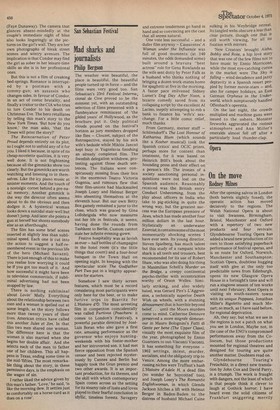San Sebastian Festival
Mad sharks and journalists
Philip Bergson
The weather was beautiful, the place is beautiful, the beautiful people turned up in force — and the films were very good too. San Sebastian's 23rd Festival internal cional de Cine proved to be the sunniest yet, with an outstanding selection of films presented with a flamboyance reminiscent of 'the gilded years' of Hollywood, as the brochure put it. Only political clouds poured on the festival's horizon as jury members dropped like flies — Clouzet, subject of the Retrospective, stayed by his sick wife's bedside while MiklOs JancsO kept busy in Yugoslavia finishing an already completed film. The Swedish delegation withdrew, protesting against those death sentences. The Italians were conspicuously missing from their box in the enormous Teatro Victoria Gugenia, and rumours flew that their film-unions had blackmailed Joseph Losey and Helmut Berger into absenting themselves at the eleventh hour. But our own Betty Box gamely remained a juror to the close, which was graced by Gina Lollobrigida who now measures out her life in festivals, it seems, having done the rounds from Tashkent to Berlin. Custom cannot stale her infinite evening-gown.
Festive hospitality was as lavish as ever — half bottles of champagne in the hotel room (it's the little things that count) and a four-hour banquet in the Town Hall on opening night. In keeping with the spectacular scale The Godfather Part Two put in a lengthy appearance for starters.
Somehow I saw thirty screen features, which must be a record considering most participants were only here for the beer, or to make furtive trips to Biarritz for L'Histoire d'O. The most arresting film in competiton coincidentally was called Furtivos (Poachers: it comes to London's Festival), a powerful parable directed by JoseLuis Boran who also gave a first rate, amusing performance as the governor who enjoys huntingweekends with his foster-mother and her introverted son. it had met fierce opposition from the Spanish censor and been rejected mysteriously by Cannes and Berlin but happily took the Gran premio and two other awards. It is an important production, for its themes, and the skill with which contemporary Spain comes across as the setting for its steamy tale of lusts and loves played to their fearful conclusion in idyllic, timeless forests. Savagery and extreme tenderness go hand in hand and so convincing are the cast that all seems natural.
One vote less successful — and a duller film anyway — Cassavetes' A Woman under the Influence was full of good moments (at 140 minutes, the odds demanded some) built around a bravura "best actress" role for Gena Rowlands as the wife sent dotty by Peter Falk as a husband who thinks nothing of bringing a dozen work-mates home for spaghetti at five in the morning. A faster pace enlivened Sidney Lumet's Dog Day After Noon, a bizarre comedy saved from its collapsing script by the excellent Al Lacino, ineptly attempting to rob a bank to finance his 'wife's' sexchange. For a little comic relief, much thanks.
From Germany, sterner stuff — Schlorndorff s The Lost Honour of Katharina Blum (which sounds like a Kosher musical) took the Spanish critics' and OCIC prizes, perhaps more for content than treatment, for it was based on Heinrich Boll's book about the hounding press and their effect on a person's life. The ironies of a society sanctioning personal inquisitions were not lost on the Spanish audience. Reasonably received was the British entry Conduct Unbecoming, from the play about officers in India who take to pig-sticking in quite the wrong way, but the greatest success was the European premiere of Jaws, which has made another four million dollars in the last hour.
Stylistically an underwater Exorcist, it contains some of the most momentarily shocking scenes I have ever seen. Its young director, Steven Spielberg, has much talent but this study of a rampant white shark is all teeth and trousers, best recommended for its use of Robert Shaw, who was also doing his thing in Maximilian Schell's Murder on the Bridge, a creepy continental psycho-thriller with eccentricities worthy of Orson Welles. Similarly striking, and also widely hated, was Gerard Pire's L'Aggression, a technically superior Death Wish on wheels, with a stunning denouement that is horrible beyond belief . . until the Moors murders come to mind. Catherine Deneuve preserved a more soignee demeanour in Mauro Bolognini's Fatti di Genie per bene (The Upper Class), visually the most exquisite film of the year, photographed by Ennio Guarniers to out-Visconti Visconti. It has something for everyone — 1902 settings, incest, murder, socialism, and the obligatory trip to Venice. Among the more embarrassing niches were Truffaut's hash L'Histoire d'Adele H, a dead film (no wonder he 'boycotted' too), and Joseph Losey's The Romantic Englishwoman, in which Glenda Jackson hitches a lift with Helmut Berger in Baden-Baden to the distress of husband Michael Caine pec-ua.,tor October 4, 1975
sulking in his Weybridge retreat. Its tangled webs obscure a less than clear picture, though one thays still worth viewing, for all its fixation with mirrors.
'New Creators brought Alsha, Bobby and Rose, a hip love story that was one of the few films not to have music by Ennio Morricone, while the most eye-catching curios in the market were The Sky is falling — wind decadence and jazzy depravity in a Spanish resort peopled by former movie-stars — and, also for camper holidays, an East German Orpheus in the Underworld, which sumptuously handled Offenbach's operetta.
On the ' last night, the crowds multiplied and machine guns were issued to the ushers. Monster fireworks aggravated the riotous atmosphere and Ann Miller's emeralds almost fell off after a particularly loud thunder-clap.


































 Previous page
Previous page